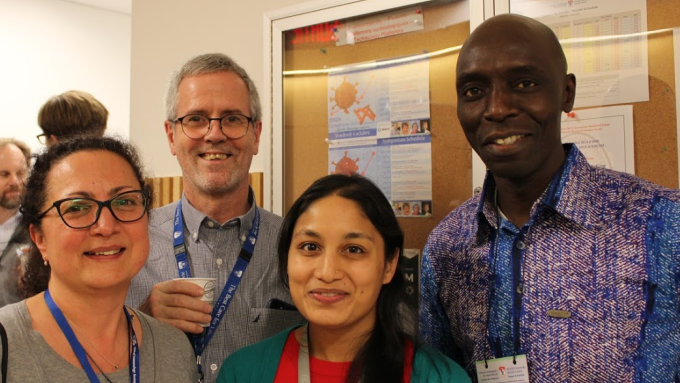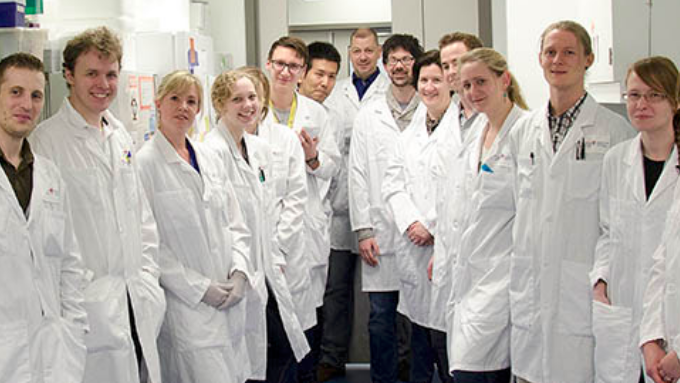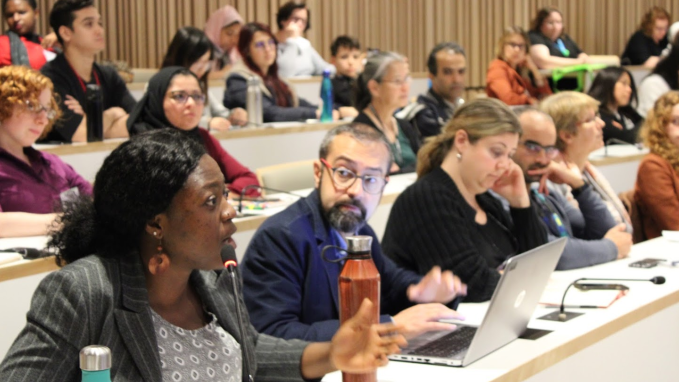Lab Information
Ciriaco Piccirillo (PhD)
Senior ScientistCentre for Translational Biology
Department of Microbiology & Immunology (McGill)
http://www.piccirillolab.wix.com/piccirillolab
Keywords
Immunology • T cell biology • autoimmune diseases • inflammatory diseasesResearch Interests
My research focuses on the regulation of innate and adaptive immune responses mediated by Foxp3+ regulatory T (Treg) cells, a unique population of CD4+ T cells with potent immunosuppressive functions in humans and mice. Normal development and function of Foxp3+ Treg cells is essential for the protection from autoimmune diseases and developmental or functional defects in Treg cells in mice and humans unequivocally provokes many inflammatory and autoimmune diseases. Our research is responsible for many seminal studies over the past decade related to the function and mechanism of action of Treg cells in a variety of animal models, non-human primates and humans. My research program aims to determine whether Treg cell developmental, functional or homeostatic deficiencies trigger various inflammatory disorders, and in particular autoimmune diseases like type 1 diabetes (T1D). My laboratory exploits a spectrum of molecular and cellular approaches to study the development, dynamics and molecular basis of Treg cell function in health and disease.Team Members
| Name | Position |
|---|
Latest Publications
- Genest, G., Liu, Z., Boivin, M., Alvarez, F., Banjar, S., Ton-Leclerc, S., Khoudja, R., Peero, E. K., Piccirillo, C. A., Mazer, B. D., Genest, G., Liu, Z., Boivin, M., Alvarez, F., Banjar, S., Ton-Leclerc, S., Khoudja, R., Peero, E. K., Piccirillo, C. A., Mazer, B. D., Genest, G., Liu, Z., Boivin, M., Alvarez, F., Banjar, S., Ton-Leclerc, S., Khoudja, R., Peero, E. K., Piccirillo, C. A., Mazer, B. D., Genest, G., Liu, Z., Boivin, M., Alvarez, F., Banjar, S., Ton-Leclerc, S., Khoudja, R., Peero, E. K., Piccirillo, C. A., Mazer, B. D., Genest, G., Liu, Z., Boivin, M., Alvarez, F., Banjar, S., Ton-Leclerc, S., Khoudja, R., Peero, E. K., Piccirillo, C. A., Mazer, B. D., Genest, G., Liu, Z., Boivin, M., Alvarez, F., Banjar, S., Ton-Leclerc, S., Khoudja, R., Peero, E. K., Piccirillo, C. A., Mazer, B. D., Genest, G., Liu, Z., Boivin, M., Alvarez, F., Banjar, S., Ton-Leclerc, S., Khoudja, R., Peero, E. K., Piccirillo, C. A., Mazer, B. D., Genest, G., Liu, Z., Boivin, M., Alvarez, F., Banjar, S., Ton-Leclerc, S., Khoudja, R., Peero, E. K., Piccirillo, C. A., Mazer, B. D., Genest, G., Liu, Z., Boivin, M., Alvarez, F., Banjar, S., Ton-Leclerc, S., Khoudja, R., Peero, E. K., Piccirillo, C. A. & Mazer, B. D. (2025). Intravenous immunoglobulin (IVIg) use in recurrent implantation failure: Is it time for another randomized controlled trial?. Journal of reproductive immunology, vol. 171, p. 104634.
- Genest, G., Hochberg, A., Boivin, M., Ferreira, A., Liu, Z., Beauchamp, C., Beltempo, M., Dahan, M. H., Dahdouh, E. M., Demirtas, E., Hemmings, R., Jamal, W., Kadoch, I.-J., Lapensée, L., Mahutte, N., Phillips, S., Reinblatt, S., Sylvestre, C., Buckett, W., Mazer, B. D. & Piccirillo, C. A. (2025). Outcomes of Ultimpro Testing Implementation for Patients With Unexplained Recurrent Implantation Failure: A Single-Center Retrospective Cohort Study. American journal of reproductive immunology (New York, N.Y. : 1989), vol. 94, p. e70131.
- Kristof, A. S., Hong, M., Boufaied, N., Tousson-Abouelazm, N., Dandamudi, S., Joung, K.-B., Hatzakorzian, R., Port, M., Campisi, G., Piccirillo, C. A., Fonseca, G. J., Ding, J., Heyland, D. K., Labbé, D. P., Wykes, L. & Schricker, T. (2025). Biological responses during high-dose protein nutrition in the critically ill: a randomized controlled trial. The American journal of clinical nutrition, vol. 122, p. 612-623.
- Attias, M., Alvarez, F., Al-Aubodah, T.-A., Istomine, R., McCallum, P., Huang, F., Sleiman, A., Nishimura, T., Del Rincón, S. V., Riazalhosseini, Y. & Piccirillo, C. A. (2025). Anti-PD-1 amplifies costimulation in melanoma-infiltrating Th1-like Foxp3+ regulatory T cells to alleviate local immunosuppression. Journal for immunotherapy of cancer, vol. 13.
- Alvarez, F., Acuff, N. V., La Muraglia, G. M., Sabri, N., Milla, M. E., Mooney, J. M., Mackey, M. F., Peakman, M. & Piccirillo, C. A. (2024). The IL-2 SYNTHORIN molecule promotes functionally adapted Tregs in a preclinical model of type 1 diabetes. JCI insight, vol. 9.
- Hes, C., Gui, L., Bay, A., Alvarez, F., Katz, P., Paul, T., Bozadjieva-Kramer, N., Seeley, R. J., Piccirillo, C. A. & Sabatini, P. (2024). GDNF family receptor alpha-like (GFRAL) expression is restricted to the caudal brainstem. Molecular metabolism, p. 102070.
- Al-Aubodah, T.-A., Piccirillo, C. A., Trachtman, H. & Takano, T. (2025). The autoimmune architecture of childhood idiopathic nephrotic syndrome. Kidney international, vol. 107, p. 271-279.
- Cuperlovic-Culf, M., Bennett, S. A. L., Galipeau, Y., McCluskie, P. S., Arnold, C., Bagheri, S., Cooper, C. L., Langlois, M.-A., Fritz, J. H., Piccirillo, C. A. & Crawley, A. M. (2024). Multivariate analyses and machine learning link sex and age with antibody responses to SARS-CoV-2 and vaccination. iScience, vol. 27, p. 110484.
- da Silva Lira Filho, A., Lafleur, A., Alvarez, F., Piccirillo, C. A. & Olivier, M. (2024). Implication of the Annexin 1/FPR axis in leishmanial exosome-mediated Leishmania major skin hyperpathogenesis. Frontiers in immunology, vol. 15, p. 1436151.
- Huang, J., Michaud, E., Shinde-Jadhav, S., Fehric, S., Marcq, G., Mansure, J. J., Cury, F., Brimo, F., Piccirillo, C. A. & Kassouf, W. (2024). Effects of combined radiotherapy with immune checkpoint blockade on immunological memory in luminal-like subtype murine bladder cancer model. Cancer biology & therapy, vol. 25, p. 2365452.
See also















